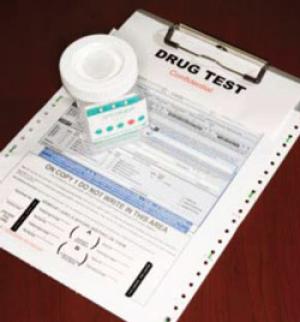Marijuana reform activity in state legislatures is at levels never seen before, but that doesn't mean we will see victory this year. Still...
Writer, filmmmaker and drug reformer Mike Gray has died. He will be missed.
A day after the drug czar's office issued its 2013 national drug strategy, the GAO reported that it isn't achieving most of the goals it identified in its 2010 national drug strategy.
The fledgling adminstration of Mexican President Pena Nieto is moving to strengthen its control over US law enforcement and intelligence agencies operating there, a change of course from the policies of his predecessor.
New Jersey Gov. Chris Christie (R), who vetoed a Good Samaritan overdose bill last fall, has reached an agreement with legislators, folding Good Samaritan language into a naloxone overdose prevention bill. That's a twofer for New Jersey!
Lots of action in California this past week, including more raids and more threat letters, plus action in various state legislatures.
Employers can fire workers who test positive for marijuana even if their use is legal in the state, the Colorado Court of Appeals has ruled.
A bid to impose drug testing on welfare recipients in Indiana has died after legislators could not agree on a means of ensuring payments to the children of recipients who tested positive.
A couple of strange and disturbing items this week, plus some good, old-fashioned thievery.
Interns are making an important difference fighting the good fight with us at StoptheDrugWar.org.
In the wake of the marijuana legalization victories in Colorado and Washington last November, and buoyed by a series of national public opinion polls showing support for pot legalization going over the tipping point, marijuana reform legislation is being introduced at state houses across the land at levels never seen before.

Oregon is one of the more promising states for marijuana legalization legislation. (Oregon State Capitol photo via oregon.gov)
While the mere fact that a bill has been introduced is no guarantee it's going to pass, that such bills are being introduced in record numbers speaks to how far the marijuana reform movement has come. According to a
legislative activity web page maintained by the
Marijuana Policy Project, decriminalization bills have been introduced in 10 states and the dependency of the Northern Mariana Islands this year, while outright legalization bills have been introduced in 11 states and the dependency of Puerto Rico.
(This article does not review current medical marijuana legislation, which will be the subject of an additional report. In the meanwhile, our Medical Marijuana Update each week provides extensive info on legislation and other developments in the issue.)
Some of the legalization and decrim bills are dead already (see below), but others remain alive. While passage of a legalization bill this year remains a long shot, decriminalization bills in some states may fare better.
NORML founder, erstwhile executive director and current legal counsel Keith Stroup has been fighting for marijuana law reform for more than 40 years. It's never looked better, he said.
"I wasn't sure I'd live long enough to see this happening, even though the demographics are on our side," he said. "A lot of these legislatures, though, are still playing around with medical marijuana, when the truth is voters are ready to go much further, probably for decriminalization and maybe for legalization. But after we won Colorado and Washington, you can see the increased confidence a number of legislators have demonstrated, and there's only going to be more of that."
Karen O'Keefe is director of state policies for MPP. She hasn't been at it as long as Stroup, but she has a solid decade of reform efforts under her belt, and she, too, said things were definitely looking up.
"When I first started at MPP, I don't think a single state had a tax and regulate bill, and now we have 11 states, and probably Ohio coming on board, too, with tax and regulate. People are realizing it's a serious issue with majority support, and legislatures are starting to catch up," said O'Keefe.
"We first saw majority support in the Gallup poll a couple of years ago, but there wasn't nearly as much activity as this year," she said. "Having two states approve marijuana legalization with solid majorities made it seem real. Colorado and Washington were initiative states, and the first medical marijuana states were initiative states, too. Once the people have led the way, legislators begin to realize it's a popular issue that makes sense and they start to act on it."
Here's what's going on in the state legislatures (excerpted with edits from the aforementioned MPP web page), with further discussion following:
Marijuana Legalization Bills
Alabama -- House Bill 550, sponsored by Rep. Patricia Todd, would allow adults 21 and older to possess or grow limited amounts of marijuana. It would also allow a regulated and taxed marijuana industry, in addition to setting up a medical marijuana program. The bill was referred to the House Public Safety and Homeland Security Committee.
Hawaii -- Speaker Joe Souki introduced House Bill 150 and House Bill 699, which would have allowed the taxed and regulated sale of marijuana to adults 21 and older. Both bills would also have allowed adults to cultivate marijuana in a locked, secure facility. On February 12, the House Judiciary Committee deferred action on HB 699, killing the bill for the year. Because of legislative deadlines, the other tax-and-regulate bill also will not be able to advance in 2013, which is the first year of Hawaii's biennial legislative session.
Maine -- Rep. Diane Russell’s LD 1229 would allow adults 21 and older to possess and cultivate limited amounts of marijuana. It would also set up a system to license and regulate growers, infused product makers, retail stores, and labs. LD 1229 would impose a $50 per ounce tax on marijuana at the wholesale level. It was referred to the Committee on Criminal Justice and Public Safety on March 26.
Maryland -- House Bill 1453, sponsored by Del. Curt Anderson, would have provided for a taxed and regulated marijuana industry. It would have also allowed adults 21 years of age and older to possess and cultivate limited amounts of marijuana. HB 1453 was referred to the House Judiciary Committee, which heard testimony on the bill on March 19. The bill did not advance out of committee before the deadline to pass the House.
Massachusetts -- Rep. Ellen Story has sponsored House Bill 1632, which would allow adults 21 and older to possess and cultivate marijuana. It would allow a regulated, taxed marijuana industry once it is legal under federal law. HB 1632 was referred to the Joint Committee on Judiciary.
Nevada -- Assembly Bill 402, sponsored by Assemblyman Joe Hogan, would allow adults 21 and older to possess and cultivate limited amounts of marijuana. It would also create a taxed and regulated legal marijuana industry. AB 402 was referred to the Committee on Judiciary, but it did not advance before the deadline.
New Hampshire -- Rep. Steve Vaillancourt proposed House Bill 492, which would tax and regulate marijuana for adults’ use. It would also allow adults 21 and older to cultivate up to six plants. The Criminal Justice and Public Safety Committee retained HB 492, meaning it will study the issue this fall. In addition, Rep. Mark Warden introduced House Bill 337, which would have made marijuana legal without imposing regulations. HB 337 received 112 votes on March 13, including from 52 Republicans, but 239 representatives voted against the bill, so it is dead for the year.
New Mexico -- Sen. Gerald Ortiz y Pino introduced Senate Joint Memorial 31, which would have directed the state's Economic Development Department to study the budgetary implications of a legal marijuana industry. The legislative session ended without SJM 31 receiving a floor vote.
Oregon -- The House Committee on Revenue introduced House Bill 3371, which would allow persons 21 and older to grow and possess marijuana. It would also set up a system of taxation and regulation for the commercial production and sale of marijuana, similar to alcohol. The bill was referred to the House Committee on Judiciary, which approved the bill on April 2. The bill is now pending in the House Committee on Revenue.
Pennsylvania -- Senate Bill 528, sponsored by Sen. Daylin Leach, would regulate marijuana similarly to alcohol. It would allow adults 21 years of age or older to purchase, cultivate, and possess limited amounts of marijuana. On April 3, the bill was referred to the Senate Law and Justice Committee.
Puerto Rico -- Sen. Miguel Pereira has introduced a bill, Senate Bill 517, which would make it legal for adults 21 and older to possess marijuana but would not provide for regulated distribution or cultivation.
Rhode Island -- On February 6, Rep. Edith Ajello introduced House Bill 5274, the Marijuana Regulation, Control, and Taxation Act, which was referred to the House Judiciary Committee. The bill would tax and regulate marijuana sales for adults' use and would allow adults to cultivate up to three mature marijuana plants. Sen. Donna Nesselbush sponsors the Senate companion bill, Senate Bill 334. The bills are pending in the House and Senate judiciary committees.
Vermont -- Rep. Susan Davis’ House Bill 499 would have allowed adults 21 and older to possess up to two ounces of marijuana and to grow up to three plants. It would have required the Department of Liquor Control to regulate marijuana wholesalers, retailers, and labs and impose a $50 per ounce tax at the wholesale level. The bill did not advance before the crossover deadline. In addition, Sen. Jeanette White's Senate Bill 160 would create a Study Committee on the Regulation and Taxation of Marijuana, which would be a legislative committee that would study a process for licensing marijuana businesses along with a taxation and regulatory structure.
Decriminalization Bills (generally speaking, see the notes)
Hawaii -- Sen. Kalani English sponsored Senate Bill 472, which would punish possession of up to an ounce of marijuana with a civil fine, while Sen. Donovan De la Cruz sponsored Senate Bill 739, which would impose a civil fine of up to $100 for no more than an ounce of marijuana. The Senate unanimously approved SB 472 on March 5. Both bills are dead for the year, but they will carry over to the second year of the state's two-year session.
Illinois -- House Bill 2332 would have imposed a civil fine on possession of a tiny amount of marijuana -- 0.1 gram. It did not advance before the deadline.
Indiana -- Senate Bill 580, sponsored by Sen. Karen Tallian, would have made possession of less than two ounces of marijuana a class C infraction punishable by a fine only with no possibility of jail time. The bill, which was referred to the Senate Committee on Corrections and Criminal Law, would also have made other reforms to Indiana's marijuana laws, including allowing hemp. The bill did not advance before the crossover deadline.
Maryland -- Senate Bill 297, sponsored by Sen. Robert Zirkin, would have reduced the maximum penalty for possession up to 10 grams of marijuana to a $100 civil fine. The Senate approved the bill in a 30-16 vote on March 19, but it did not get a vote in the House Judiciary Committee before the legislature adjourned on April 8. Another bill sponsored by Sen. Zirkin -- Senate Bill 394 -- would have made the maximum fine for marijuana possession a $100 civil fine. That bill was withdrawn.
Michigan -- House Bill 4623, sponsored by Rep. Jeff Irwin, would replace possible jail time and criminal penalties with civil fines of $25, $50, or $100, depending on the number of prior convictions the person has for marijuana possession. The bill was introduced on April 24 and was referred to the House Committee on Judiciary.
Missouri -- Rep. Rory Ellinger has introduced House Bill 512, which would reduce the penalty for possession of less than 35 grams of marijuana from up to a year in prison to a fine of no more than $250 and a suspended sentence.
New Mexico -- House Bill 465, sponsored by Rep. Emily Kane, would have reduced the penalty for first offense possession of up to an ounce of marijuana to a $50 civil fine. A second offense would have been a petty misdemeanor carrying a $100 fine. It would have also imposed fines for up to eight ounces of marijuana. The bill passed the House, but the session ended before the Senate could vote on it.
New Hampshire -- Rep. Kyle Tasker proposed House Bill 621, which would impose a fine on simple possession of marijuana. On March 21, the House of Representatives amended the bill to apply only to a quarter of an ounce of marijuana and to impose a fine of up to $200. It then approved the bill in a 214-115 vote, sending it to the Senate. On April 16, the bill received a negative recommendation in the Senate Judiciary Committee.
New Jersey -- Senate Bill 1977, sponsored by Sen. Nicholas Scutari, would impose a $50 fine on up to 50 grams of marijuana (nearly two ounces). Assembly Bill 1465, sponsored by Assemblyman Reed Gusciora, was introduced in 2012 and passed the Assembly. The bill would impose civil fines starting at $150 on possession of up to 15 grams of marijuana. Both bills are pending in the Senate Judiciary Committee.
New York -- Senate Bill 3315 would eliminate the "public use" exception to the state's decriminalization law, a reform supported by Gov. Andrew Cuomo. [Note: Although New York decriminalized in the 1970s, New York City police have continued to arrest tens of thousands of people each year under the "public use" exception.]
North Carolina -- Rep. Rep. Kelly Alexander sponsors House Bill 637, which would downgrade the penalty for possession of a small amount of marijuana from a misdemeanor that does not carry jail time to a civil infraction. [Note: This is a depenalization, not a decriminalization, bill.]
Northern Mariana Islands -- House Bill 18-42, sponsored by Rep. Christopher Leon Guerrero, would impose a $50 fine on marijuana possession in the U.S. territory.
Texas -- Rep. Harold Dutton, Jr. sponsors House Bill 184, which would make up to one ounce of marijuana a class C misdemeanor, punishable by a $500 fine. It was referred to the House Criminal Jurisprudence Committee, which approved an amended version of the bill on April 23. The bill would now only apply to persons under 21 for their first offense.
Vermont -- Senate Bill 48, sponsored by Sen. Joe Benning, and House Bill 200, sponsored by Rep. Chris Pearson, would impose a civil fine on possession of up to an ounce of marijuana. Under H. 200, a person under 21 who is found in possession of up to an ounce of marijuana would have to undergo substance abuse screening and possible treatment. On April 16, the House of Representatives approved H. 200 in a 92-49 vote, sending the bill to the Senate. Gov. Peter Shumlin has been a strong proponent of replacing criminal penalties with a civil fine.

Denver "420" rally, April 2013 (facebook.com/pages/420-Rally/104447806260934)
As the lists demonstrate, some bills have died already, but others still breathe, and some could even pass this year.
"We're most involved in Vermont, and we're very hopeful the decriminalization bill there will pass before the legislature adjourns," said MPP's O'Keefe. "The bill is in the Senate, and the governor is supportive. That's probably the best chance for removing criminal penalties this year."
Passing a legalization bill could take a little longer, she said.
"Tax and regulate could end up taking a couple of years," said O'Keefe, "but the bills in Maine and Oregon are getting serious consideration, and Rhode Island legislators seem very reasonable. But we don't think it's likely to pass in Rhode Island this year, although we are hopeful in will in the next couple of years be one of the first states to pass it."
That it should take a year or two or three to get marijuana legalization passed in any given state legislature is no surprise, O'Keefe said.
"We've had a lot of bills that got a vote one year, but legislators needed more time to think and be educated," she pointed out. "In Illinois, the House twice voted down medical marijuana before passing it, and in New Hampshire tax and regulate has slowly been gaining more and more support. This isn't something legislators are used to, and in most cases it takes them awhile to get used to it."
For Stroup, using the initiative process in states that allow for it is the best bet, but he cautioned that the movement is going to have to be able to win victories at the statehouse, too.
"Any time we have the choice of going to the people, it's always in our interest to do so," he said. "We know increasingly from the public opinion surveys that if the people decide, we win. Elected officials remain more timid about this than the public -- they're really worried about getting reelected and less worried about reform legislation -- but realistically, we have to be able to win in the states that don't have initiatives."
When it comes to passing bills, though, Stroup drew a parallel with the first burst of decriminalization efforts in the 1970s. Oregon and Maine went for decriminalization early in the decade, but the other handful of states that decriminalized in that era only came in at the end of the decade.
"When we won those first couple of states in the 1970s, we thought we were off and running, but the other states were all waiting to see what would happen, so we didn't win anything for a couple of years," he recalled. "I think we're in the same phase now when it comes to legalization. I have no doubt we will eventually win full legalization everywhere, but for the next couple of years, people in Colorado and Washington are going to have to be especially careful that they are demonstrating responsible use."
Cannabis culture celebrations like 4/20 have their place, said Stroup, but the rest of the time, it should be about responsible use.
"That's not the tactic we need the rest of the year," he said. "We want to demonstrate to the average person that nothing really changes when you legalize marijuana except you quit arresting responsible marijuana smokers and raise some revenue. What we don't want is a bunch of out-of-control pot smokers driving crazy -- that will scare neighboring states and cause a political backlash," the veteran activist warned.
"A backlash because of bad behavior won't stop us -- the demographics are on our side -- but whether it takes five years or 15 depends to some degree on how well we behave ourselves. We may see decriminalization pass somewhere, but I don't think we'll win legalization this year. I think before that passes in state legislatures, those lawmakers need to see that what Colorado and Washington did was a good thing."
The process of turning legalization victories at the voting booth into actual taxed, regulated, and legal commerce in Colorado and Washington is a process in progress in both states right now. By next year, those two states should be living experiments in marijuana legalization. Doing it right there will make it easier to get it done elsewhere. If not this year, next year. Or 2016.
back to top
We received word Wednesday that Mike Gray, probably best known in the drug reform community as the author of "Drug Crazy: How We Got in this Mess and How We Can Get Out," has died.

Mike Gray, RIP
A fixture at drug reform conferences for the last decade, Gray had been a staunch advocate of ending drug prohibition and had worked with Robert Field at
Common Sense for Drug Policy to publicize the abuses of the drug war and assist local activists seeking reform. Among his many works at
CSDP were the DVDs "
Law Enforcement Against Prohibition," highlighting spokespersons of the group by the same name, and "
Cops & Clergy Condemn the War on Drugs."
Born in 1935 in Darlington, Indiana, Gray received an engineering degree from Purdue University, but found his life's work in documenting political violence as a filmmaker. He was a cofounder of the Chicago-based Film Group, a pioneering collection of documentary filmmakers whose works included "The Murder of Fred Hampton," the Chicago Black Panther leader gunned down by police in 1969. Gray's iconic coverage of the police riots at the 1968 Chicago Democratic convention were seen around the world.
Gray moved to Los Angeles in 1973, where he expanded his creative endeavors to include screenwriting credits for four-time Oscar nominated "The China Syndrome" and other films, for episodes of "Star Trek: The Next Generation," as well as a number of books. His written work addressed issues such as the nuclear accident at Three Mile Island and the use of the death penalty, as well as drug reform. In addition to "Drug Crazy," Gray returned to the issue of drug policy with "Busted: Stone Cowboys, Narco-Lords, and Washington’s War on Drugs."
Gray won the Writers Guild of America Award for Best Original Drama and was nominated for an Academy Award for Best Original Screenplay, and for the BAFTA Award for Best Screenplay.
Your reporter conversed briefly with Gray at the California NORML conference in January. He didn't appear to be in ill health; his death comes as a shock, if not a surprise, given his age. He will be missed.
back to top
Just a day after the Office of National Drug Control Policy (ONDCP -- the drug czar's office) released its latest annual national drug control strategy, the Government Accountability Office (GAO) has issued a report finding that ONDCP has fallen well short of goals enunciated in its 2010 national drug strategy.
In the report,
Office of National Drug Control Policy: Office Could Better Identify Opportunities to Increase Program Coordination, GAO noted that
ONDCP and the federal government "have not made progress toward achieving most of the goals articulated in the 2010 National Drug Control Strategy." In some areas, including reducing teen drug use, reducing drug overdose deaths, and reducing HIV infections from injection drug use, GAO found,
ONDCP was not only not making progress, but sometimes the numbers were moving in the opposite direction.
For instance, under the broader goal of "curtailing illicit drug consumption in America," ONDCP had set use reduction goals to be achieved by 2015. It sought to reduce last month drug use by teens by 15%, but has achieved no movement. Similarly, it sought a 15% reduction in past month use by young adults, but has achieved no movement. It also sought to reduce lifetime use of drugs, alcohol, and tobacco by 8th graders by 15%, and was making progress toward its goal with alcohol and tobacco, but not with illegal drugs.
Likewise, under ONDCP's broad goal of "improving the public health and public safety of the American people by reducing the consequences of drug use," ONDCP identified goals of reducing overdose deaths, drug-related hospital emergency room visits, and drug-related HIV infections by 15% by 2015, but showed "movement away from goal" between 2010 and 2012.
Drug czar Gil Kerlikowske is talking up a "21st Century Approach" to drug use with a heavy emphasis on treatment and prevention, but the latest national drug budget still allocates 58% of funding to law enforcement and interdiction. And those remaining funds for treatment and prevention are "fragmented" across 15 federal agencies, with much overlapping. GAO reviewed 76 federal drug treatment and prevention programs and found 59 of them overlapped.
GAO did note that while ONDCP was not showing progress in most of its goals, it had implemented 107 of the 112 "action items" contemplated to meet those goals. The auditors noted that "ONDCP officials stated that implementing these action items is necessary, but may not be sufficient to achieve Strategy goals."
back to top
In a sharp break with the policies of his predecessor, recently installed Mexican President Enrique Pena Nieto is moving to restrict the open relationships US law enforcement, intelligence, and security agencies have developed with their Mexican counterparts as the two countries attempt to repress violent and powerful Mexican drug trafficking organizations, the so-called cartels.

The US-Mexico border (wikipedia.org)
The move was hinted at broadly in the
Washington Post Sunday and confirmed by the
Associated Press Monday. The AP cited deputy foreign secretary for North American affairs Sergio
Alcocer as saying that all US law enforcement contacts with Mexican agencies will go through "a single window," the Mexican Interior Ministry.
Mexico has had a historically prickly relationship with US drug law enforcers, but under former Mexican President Felipe Calderon, whose term ended in December, US law enforcement and security cooperation with Mexican agencies expanded dramatically. The DEA, as well as the FBI, CIA, and Border Patrol, had agents working directly with units of the Mexican Federal Police, the army, and the navy.
US law enforcement and security agencies worked closely with their Mexican counterparts on a strategy that aimed at arresting or killing top cartel figures, and managed to eliminate dozens of them, but at the same time, prohibition-related violence only mounted, with the death toll somewhere above 70,000 during Calderon's six-year term. The incoming Pena Nieto administration has previously signaled that it wants to shift away from high-profile target strategy to one centered on crime prevention.
The Pena Nieto administration also represents a reversion to governance by the Institutional Revolutionary Party (PRI), which had famously ruled Mexico as "the perfect dictatorship" for most of the 20th Century before falling to conservative National Action Party (PAN) presidential candidate Vicente Fox in 2000. Like Fox, Calderon ran under the PAN banner and cultivated closer relations with the US, especially on drug enforcement, than the PRI ever had. The PRI's relationships with US drug enforcers could be characterized as one of mutual suspicion and distrust, with occasional bouts of cooperation.
As the Washington Post reported, high-ranking incoming PRI officials who met with US DEA, CIA, FBI, and other security representatives in December were stunned and "remained stone-faced as they learned for the first time just how entwined the two countries had become during the battle against narco-traffickers, and how, in the process, the United States had been given near-complete entree to Mexico's territory and the secrets of its citizens."
Now, the Pena Nieto government is moving to get a better grip on the assistance it gets from its neighbor to the north. It was in the interest of Mexico to do so, Alcocer said. "The issue before is that there was a lack of coordination because there was not a single entity in the Mexican government that was coordinating all the efforts," he told the AP. "Nobody knew what was going on."
The DEA and other agencies declined comment, leaving it the State Department, which said it looks forward to "continued close cooperation" with Mexico. President Obama flies to Mexico City Thursday for a meeting with Pena Nieto, whose administration says it wants to expand its bilateral agenda with the US beyond drugs and immigration, as well as shift from dramatic law enforcement actions to crime prevention and public safety.
"For us the security theme is one of our top priorities, but it's not the only one," Alcocer said. "The relationship has issues such as the economy and trade, advanced manufacturing, infrastructure, energy."
back to top
Last fall, New Jersey Gov. Chris Christie (R) vetoed the Good Samaritan Emergency Response Act (Assembly Bill 578), which would have provided limited legal protection to people who witness a drug overdose and summon help. But on Tuesday, Christie changed his tune, reaching an agreement with legislative leaders to include Good Samaritan language in another overdose prevention bill that is sitting on his desk.
The legislature had meanwhile passed
Assembly Bill 3095 to expand access to the
opioid overdose antidote
naloxone. Under the agreement with legislators, Christie conditionally vetoed that bill and agreed to add the Good Samaritan language. The legislature then reconvened, passing the amended measure by votes of 24-1 in the Senate and 68-2 in the House.
The Good Samaritan language Christie agreed to is less broad than envisioned in AB 578, but advocates said it still contains the most important protections for an effective Good Samaritan bill -- it would protect individuals from arrest and prosecution for drug possession charges as well as protection from revocation of parole and probation.
"My family and I are so thankful for this compromise," said Patty DiRenzo of Blackwood, whose son Salvatore died of an overdose at age 27. "We, and the other families who have lost loved ones to overdose, look forward to the day that Governor Christie signs this life-saving bill. It's extremely important that we prevent future overdose deaths and spare other families the grief that mine has endured."
"We are incredibly grateful to the governor and legislative leadership and sponsors of these bills for working so hard to reach an agreement on this life-saving legislation,” said Roseanne Scotti, New Jersey state director for Drug Policy Alliance.
As prescription drug overdose numbers have mounted in the past decade, an increasing number of states have adopted measures such as Good Samaritan laws and widening the availability of naloxone in a bid to reduce the death toll. California, Connecticut, the District of Columbia, Illinois, Massachusetts, New Mexico, New York, North Carolina, Rhode Island, and Washington have all passed both kinds of law, while Colorado and Florida have passed Good Samaritan laws and Virginia has passed a naloxone law.
back to top
Lots of action in California this past week, including more raids and more threat letters, plus action in various state legislatures and elsewhere. Let's get to it:
CaliforniaLast Wednesday, local law enforcement raided three San Bernardino dispensaries. City Attorney's office officials, and police, fire, and code enforcement officers served search warrants and issued demands that they cease and desist from allegedly unlawful activities. The dispensaries hit were Trio Holistic Center, Berdo Medical Center, and THC First Time Patients. San Bernardino authorities banned dispensaries last year. In February, they raided three other dispensaries.
Last Tuesday, the Vallejo city council approved a 45-day moratorium on new dispensary applications. A number of dispensaries already operate in Vallejo without the city's permission, although voters last year approved a 10% tax on their sales. The city quit accepting business license tax applications for dispensaries in January. City officials said they need time to sort out the confusion. Now, the city must move forward to either regulate or ban dispensaries, although the moratorium could be extended another two years.
On Wednesday, Vallejo police returned marijuana to two dispensaries raided last year. Nearly 60 pounds of medical marijuana and hundreds of dead plants were returned to Better Health Group and the LES collective. Police gave the property back after a judge dismissed the criminal cases against the two dispensaries. Police last year raided numerous Vallejo dispensaries, but have lost every criminal case they have brought, and prosecutors have dropped the charges in others.
On Tuesday, a medical marijuana regulation bill passed the Senate Public Safety Committee. Senate Bill 439 is described by its sponsor, Sen. Steinberg, as a placeholder, "a vehicle to engage stakeholders" in the process of legislating statewide regulations. Steinberg said he is in close contact with Assemblyman Tom Ammiano, who has introduced companion legislation, Assembly Bill 473, and that it could take one to two years to complete the process.
Also on Tuesday, the Senate Public Safety Committee refused to pass a drugged driving bill that could impact medical marijuana patients. The bill, Senate Bill 289, would create a zero-tolerance drugged driving offense, but the committee was skeptical. It did, however, leave the door open for the bill to be amended.
Also on Tuesday, word emerged that federal prosecutors have sent out more dispensary threat letters. They were issued by the office of US Attorney for the Northern District of California Melinda Haag and target the landlords of dispensaries in San Jose, San Francisco, and Ukiah. The letters warn landlords that the facilities are operating too close to a school or park. In addition, the letters warn landlords that they are liable for forfeiture under USC Title 21, Section 881(a) 7. Unlike some previous letters, they do not threaten immediate prosecution or set a deadline for compliance.
Colorado
Last Thursday, the Colorado Court of Appeals ruled that employers can fire medical marijuana users who fail a drug test. The ruling came in the case of a quadriplegic telephone operator for the Dish Network, who was fired after failing a drug test. He argued that he shouldn't have been fired because his actions were legal under state law, but the court held that because marijuana remains illegal under federal law, the state law he cited did not apply.
Hawaii
On Wednesday, two medical marijuana bills were approved by the state legislature. House Bill 668 transfers control of the medical marijuana program from the Department of Public Safety to the Department of Public Health, while Senate Bill 642 increases the amount of medicine a patient can possess from three to four ounces and allows patients to have up to seven plants, but also amends the law so that only a patient's primary care physician can recommend marijuana.
Idaho
On Monday, Idaho medical marijuana activists fought back after authorities seized their children. The children were taken from a Boise couple and a Boise single mom who are leading Idaho activists after a child at the school their children attended fell ill and marijuana was blamed. Police and child protective services workers went to the home while the parents were on a retreat and took the kids, as well as some marijuana and paraphernalia. One set of kids has been returned, the other two remain in foster care.
Maryland
On Wednesday, a spokeswoman for Gov. Martin O'Malley confirmed he will sign a medical marijuana bill. The formal signing is set for Thursday. The bill allows academic medical research centers to establish programs to dispense marijuana to sick patients.
New Hampshire
On Tuesday, Gov. Maggie Hassan said she wants home cultivation stricken from a pending medical marijuana bill. Bill supporters said they were disappointed and that patients with terminal conditions couldn't wait the 18 months to two years it could take for dispensaries to get up and running. The governor "shares the concerns of law enforcement about the state's ability to effectively regulate a home-grow option," spokesman Marc Goldberg said in a statement. Hassan voted for a medical marijuana bill in 2009 that included a home-grow option. The proposal is now being rewritten in a Senate committee.
New Mexico
On Tuesday, the state Department of Health agreed that PTSD should remain a qualifying condition for medical marijuana. The move upheld a recommendation by the Medical Cannabis Program's Medical Advisory Board, which had faced an effort to withdraw PTSD as a qualifying condition.
back to top
Colorado employers can legally fire marijuana users from their jobs, the state Court of Appeals ruled Thursday in a 2-1 decision. Although the case was brought by a medical marijuana user, the ruling will have any even broader impact given that the state has now legalized marijuana for all adults.
The case was
Coats v. Dish Network LLC, in which Brandon Coats, a quadriplegic telephone operator for Dish Network and registered medical marijuana patient, was fired by Dish Network after testing positive for marijuana during a drug test. Paralyzed by a car crash as a teen, Coats had been a registered patient since 2009. Dish Network cited no other reason for firing Coats other than his positive drug test result.
Coats challenged his firing, citing Colorado's Lawful Activities statute, which prohibits employers from firing workers for "engaging in any legal activity off the premises of the employer during nonworking hours." But both the trial court and now the appeals court rejected his challenge, holding that because marijuana remains illegal under federal law, the Lawful Activities statute does not apply.
"For an activity to be lawful in Colorado, it must be permitted by, and not contrary to, both state and federal law," the appeals court said.
Judge John Webb dissented, saying he could not find a case addressing whether Colorado judges must consider federal law in determining the meaning of the Colorado statute.
Coats' attorney, Michael Evans, said in a statement that the ruling will have a broad impact in the state.
"This case not only impacts Mr. Coats, but also some 127,816 medical marijuana patient-employees in Colorado who could be summarily terminated even if they are in legal compliance with Colorado state law," Evans said.
And with adult marijuana legalization now in place in the state, it is not just medical marijuana users who stand to be affected.
The ruling is expected to be appealed.
Similar rulings allowing employers to fire medical marijuana users have been upheld by courts in other states, including California, Michigan, and Montana.
back to top
A bill that would have required Hoosier State welfare recipients to undergo drug testing based on a "reasonable suspicion" of drug use was killed Friday after the state Senate refused to act on it. The bill had already passed the House, but died when Senate and House negotiators could not agree on what to do about payments to children whose parents had tested positive for drugs.
The bill,
House Bill 1483, would have required the Department of Family and Social Services to create a drug abuse assessment program for welfare recipients, with those whose screenings indicated a likelihood of drug use subject to drug testing. People who tested positive would not be immediately subject to loss of benefits, but would have to successfully pass two consecutive drug tests within 40 to 60 days to continue receiving benefits. If the person does not provide two clean drug tests within four months, he or she would lose benefits for three months. After three months, the individual could again apply for benefits, but would have to pass a drug test.
As with other states seeking to avoid constitutional challenges by using the "reasonable suspicion" standard instead of mandatory, suspicionless drug testing, Indiana legislators used an expansive definition of the term. "Reasonable suspicion" could be derived from having a prior drug conviction, the results of the drug screening inventory, or having failed a previous drug test.
While legislators in both houses agreed on the desirability of subjecting welfare recipients to drug testing, the differed on a provision allowing welfare benefits to be provided to a third party to ensure that children did lose their support. The Senate had approved an amendment to the House version of the bill providing for third party payments, but the final version of the bill crafted by House and Senate negotiators did not include that language, and the Senate then refused to give it a final vote.
The bill's goal was to help families with drug-using parents "and at the same time not punish the children," said Senate President Pro Tem David Long (R-Fort Wayne). "You can turn yourself into a pretzel trying to do the right thing. We didn't feel it was ready."
Public benefits drug testing bills remain alive in several states this year, including Alabama, North Carolina, and Texas.
back to top
A couple of strange and disturbing items this week, plus some good, old-fashioned thievery. Let's get to it:
In Quincy, Illinois,
an Adams County probation officer was arrested last Friday on charges he was cooking meth at his home with a probationer who resided with him. Probation officer John
Grotts, who also served as the department's drug court liaison, went down after the Adams County Sheriff's Office and the West Central Illinois Drug Task Force raided and searched his home following complaints from neighbors.
Grotts is charged with possession of methamphetamine and unlawful use of a property to violate the Methamphetamine Control Act, both felonies. His probationer roommate, who was also a graduate of the drug court program
Grotts monitored, was arrested on an outstanding warrant for illegal possession of meth precursors.
In Milwaukee, a former Milwaukee police officer pleaded guilty last Monday to eight charges for conducting illegal strip searches and body cavity searches on black male drug suspects. Michael Vagnini, 34, had faced 25 criminal charges, including seven counts of sexual assault, but those charges were dropped, and he pleaded no contest to four felony and four misdemeanor counts of misconduct in public officer. Prosecutors said Vagnini regularly pulled over drivers on pretenses such as not wearing a seat belt and searched them without legal reason, often conducting searches of men's anal and scrotal areas, including inserting his finger into their rectums. Three other police officers charged with Vagnini -- Jeffrey Dollhopf, Brian Kozelek and Jacob Knight -- had had their cases separated because they face fewer counts and were not charged with sexual assault. They are charged with misconduct in office and being parties to the crimes of illegal searches, based on their on-duty presence when prosecutors say Vagnini committed them. They are set for June trials. All are suspended with pay, as Vagnini was until he pleaded no contest.
In Phoenix, a former Maricopa County Sheriff's deputy pleaded guilty last Tuesday to stealing money that was supposed to be paid to a confidential drug informant. Torrey McRae made off with more than $5,000 in snitch cash and later tried to repay the money without being detected, but it was too late. His supervisors had already noticed discrepancies in the account used to transfer money to informants, and he was arrested in March. He pleaded guilty to one count of theft, two counts of forgery, and two counts of misuse of public money by a custodian. He will be sentenced May 20.
back to top
StoptheDrugWar.org works for an end to drug prohibition worldwide and an end to the "drug war" in its current form. We believe that much of the harm commonly attributed to "drugs" is really the result of placing drugs in a criminal environment. We believe the global drug war has fueled violence, civil instability, and public health crises; and that the currently prevalent arrest- and punishment-based policies toward drugs are unjust. Please visit our web site, and please read more about us.
We are seeking Legislative, Writing/Research, Web Content, Information Technology, and Admin/Finance interns (potentially still this semester, depending on your interests, definitely for the summer). Communications may also be applicable to current organizational projects. Preference will be given to applicants with some demonstrated experience the relevant fields, and to applicants in the Washington, DC area. However, consideration will also be given to enthusiasm for drug policy and criminal justice reform.
Note that StoptheDrugWar.org internships are unpaid. We reimburse for metro fare. Please also note that the organization has functioned as a "virtual office" environment since spring 2011. Staff will meet with interns on a regular basis during the semester, and can be available to meet and work together on a weekly or even daily basis, but this will happen in places like coffee shops or campuses.
In order to help our interns forge ties with the larger community, we are organizing intern networking social hours with other organizations in drug policy and justice reform. We are also arranging tours of the DC courts and possibly jail, and public health and other programs that have bearing on drug policy. Interns are also welcome to join us at the frequent legislative working group meetings that take place on our issues here in Washington.
Please send cover letter, resume, and any supporting material you'd like to include, to StoptheDrugWar.org executive director David Borden, at [email protected]. (We recommend using a return receipt to ensure your emails are not blocked by any filters.) Thank you, and we look forward to hearing from you. Information on our specific intern positions follows below.
Legislative
Legislative interns will help, and in some cases play a leading role, on the following organizational projects:- Bill and vote tracking, at the federal and state level, including write-ups for our web site's legislative center (possibly in collaboration with Writing interns);
- Creating action alerts on current legislation and other advocacy priorities, to be distributed through our web site and email list (possibly in collaboration with Writing and Web Content interns); and
- Coalition outreach to secure partners for organizational sign-on letters to Congress.
Interns may also join us at working group meetings on issues including but not limited to sentencing reform, drug policy including marijuana law reform; collateral consequences of criminal convictions; and reinvigorating the presidential clemency/pardon system. Spanish-language skills may be useful.
Writing/Research
Writing/Research interns will have the following opportunities:
- Assist Drug War Chronicle editor Phillip S. Smith with ongoing article collection and research for feature articles on our web site (which are frequently reprinted on major news sites such as alternet.org).
- Assist with research on special topics, the goal of which is the publication of special reports. Likely projects include but are not necessarily limited to follow-up research on US drug war killings (see our recent report here); procuring drug arrest data and possibly arrest reports from various jurisdictions for various months and years, to evaluate the results of recent policy reforms, particularly for marijuana.
- Bill and vote tracking, at the federal and state level, including write-ups for our web site's legislative center (possibly in collaboration with Legislative interns);
- Creating action alerts on current legislation and other advocacy priorities, to be distributed through our web site and email list (possibly in collaboration with Legislative interns);
- Updating an archive of SWAT raids and other paramilitarized policing activity that went wrong (possibly in collaboration with Web Content interns); and
- Assisting with updating or creating various special sections of our web site (possibly in collaboration with Web Content interns).
Interns with Spanish-language skills may be involved with reporting on the Mexican drug war.
Web Content
Web Content interns will assist with the following work:
- Daily link and other content postings;
- Development or maintenance of special sections of our web site (possibly in collaboration with Writing interns); and
- General social media work, including a number special social media projects.
We may also initiate an informal web video series, for which intern assistance would be invaluable, but this has not been decided yet.
Information Technology
IT interns will assist with the following projects:
- Backend web site programming, primarily involving streamlining of our donations processing system;
- Server migration to a "cloud" arrangement;
- Security including PCI compliance;
- Selection and set up of needed software and services; and
- Database-related projects.
Admin/Finance
Admin & Finance interns may assist with the following organizational needs, among others:
- Bookkeeping;
- Nonprofit accounting including intra-company allocations and 990 preparation;
- Budget & cash flow analysis;
- Membership administration;
- Database work.
Admin & finance interns will gain familiarity with a significant range of nonprofits' administrative activities, and depending on schedule may have the opportunity to sit in on portions of board discussions or meetings with advisors.
Communications
As noted above, communications skills are applicable to a number of facets of our work this semester, and communications majors are encouraged to apply. We have not listed communications as a separate internship this semester, because we have not decided whether to engage in specific outreach efforts to mainstream media this semester. Along with the possibility that we will do so, other work of relevance to communications can be found in our Legislative, Writing, and Web Content internships.
Thank you for considering an internship with our organization. We look forward to hearing from you.
back to top










